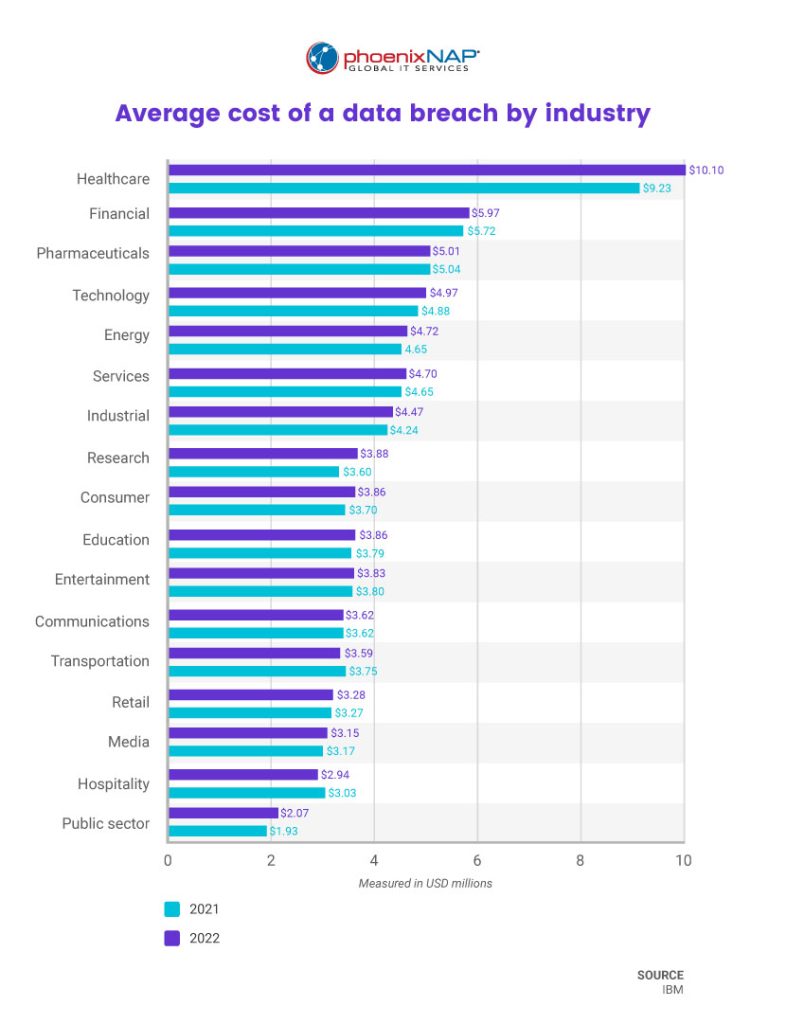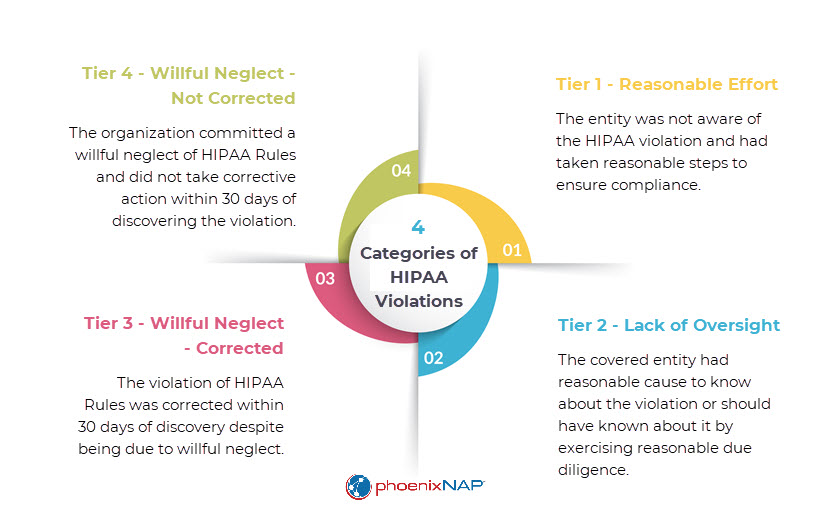HIPAA is a federal law in the United States that protects privacy and security when it comes to health information. HIPAA is applicable to healthcare providers and their business partners who manage protected health data (PHD).
Ignorance of HIPAA rules does not justify breaking them. When it comes to managing PHI, each party involved must tread carefully or face the risk of exorbitant fines, or even jail time.
This article lays out the potential fines and penalties for violating HIPAA and ways of mitigating the consequences.
HIPAA Violation Classification and Structure
HIPAA violations are classified based on the level of harm caused by the violation. The U.S. Department of Health and Human Services Office for Civil Rights (OCR) has established based on their severity.four categories of HIPAA violationsThe fines for HIPAA violations in 2023 are:
- Tier 1: from $127 to $63,973
- Tier 2: from $1,280 to $63,973
- Tier 3: from $12,794 to $63,973
- Tier 4: from $63,973 to $1,919,173
*Annual Penalty Limit: $1,919,173
Keep in mind that these are the penalty ranges. The OCR determines the fines based on the severity of the violation, the compliance history and the degree of cooperation. What Happens if You Violate HIPAA?
What Happens if You Violate HIPAA?
A HIPAA violation occurs when a covered entity or business associate fails to adhere to one or more of the provisions outlined in the HIPAA, Privacy, or Security Rules.Breach NotificationHIPAA violations can surface through multiple channels:
- Patients who have had their PHI mishandled or inappropriately disclosed may become aware of violations.
- Healthcare workers can detect violations through regular audits and incident investigations.
- Government organizations such as the Office for Civil Rights can learn about violations from complaints or proactive compliance audits.
- Media outlets can uncover HIPAA violation and bring it to the public’s attention.
- Regardless of the source, violating HIPAA results in:
Civil penalties: HIPAA violation fines range from $127 to $1,919,173 per violation.
- Criminal penalties: In cases of intentional or reckless violation of HIPAA, individuals can face criminal charges resulting in imprisonment of up to 10 years, as well as fines.
- Loss of licensure or accreditation: Healthcare providers that violate HIPAA often face the loss of licensure or accreditation.
- Reputational damage: HIPAA violations result in negative publicity and loss of trust from patients, clients, and the public.
- Lawsuits: Individuals whose PHI was exposed or misused due to a HIPAA violation can file a lawsuit against the responsible party, seeking compensation for damages.
- Civil vs Criminal Penalties for HIPAA Violations There are two main types of HIPAA violation penalties:
Civil and Criminal
The civil penalties covered above, incentivize compliance and are mostly issued to organizations. Civil penalties are issued to encourage compliance and are primarily reserved for organizations. HHS enforces civil penalties primarily, while DOJ enforces criminal penalties. In rare instances, an organization could face both civil fines and criminal charges for the same violation. For example, in cases where an organization knowingly and willfully violates HIPAA and the infraction results in patient harm, they will face both civil fines and criminal charges.
Additionally, individuals affected by a HIPAA violation may also file a class action lawsuit against the healthcare provider or business associate depending on the type and severity of the violation.HIPAA Criminal Penalties Similar to the OCR’s civil penalties, the DOJ divides criminal violations into three separate tiers based on the severity of the offense. Judges make the final decision based on each case’s facts. The tiers of criminal penalties for HIPAA violations are:
- Tier 1: Individuals who knowingly violate the Privacy Rule by obtaining or disclosing PHI may face a fine of up to $50,000 and a maximum prison sentence of one year.
- Tier 2: If the offending party obtained PHI under false pretenses, the penalties increase to $100,000 and imprisonment for up to five years.
- Tier 3: Includes violations related to selling, transferring, or using PHI for personal gain, commercial advantage, or malicious harm and may result in fines of up to $250,000 and up to.
The Department of Justice has in pursuing those who knowingly breach HIPAA Rules.
The state attorneys general are also stepping up their efforts to crack down on data theft, and make examples of those found guilty of violating HIPAA. This is because the number of employees who have been caught stealing or accessing PHI has increased over the past few years. Read our article on 19 cybersecurity best practices to protect your business and ensure continuity. To protect your business and ensure continuity, read our article on 19 cybersecurity best practices. ten years in jail Examples of HIPAA Penalties and Settlements
Here are some real-life examples that show the unique and often unpredictable nature of HIPAA penalties and settlements:become increasingly proactive New York Presbyterian Hospital

In 2013, the New York Presbyterian Hospital allowed a TV crew to film two patients for a medical reality TV show without obtaining their consent. One of the patients tragically died while the crew was filming the emergency room. Investigation revealed that the healthcare facility had allowed the film crew to have unrestricted entry to the hospital. This led to PHI being exposed. Consequently, the healthcare institution entered into a with the OCR and committed to a corrective action plan to avoid similar incidents in the future.
Anthem, Inc.
In 2015, a series of cyber-attacks compromised the PHI of almost seventy-nine million people held by the health insurance provider then called Anthem. This was the largest data breach in history. Anthem settled the combined class-action suit filed by victims in 2018 for $115,000,000. South Florida Memorial Healthcare System
The South Florida Memorial Healthcare System paid the OCR $2.2 million settlement in 2017 after it disclosed that two employees had illegally accessed PHI for more than 115,000 of their patients, with the intention of selling the information. A comprehensive investigation discovered that a dozen staff members regularly misused the login credentials of former employees to gain unauthorized access to PHI between 2011 and 2021.
Touchstone Medical Imaging
In 2019, Touchstone Medical Imaging agreed to pay $16 million to the OCR to settle violations of the HIPAA Privacy and Security Rules. The settlement was reached after an OCR investigation of an incident in 2014 in which a laptop that had not been encrypted was stolen from a company vehicle. The laptop held PHI of over 300,000 patients.
Read our founder and CEO’s article to find out why the average cost of a data breach has reached an all-time high, and what you can do about it.
Who Issues HIPAA VIolation Fines$5.5 millionHIPAA violations fines are issued primarily by the
U.S. The Office for Civil Rights of the Department of Health and Human Services is responsible for handling HIPAA violations.
With the introduction of $3 million however, state Attorney Generals are now able to issue additional fines. The maximum fine the Attorney General can impose is $25,000 per violation category, per calendar year, while the minimum is $100.

When an organization experiences a breach that affects residents in multiple states, they may need to pay fines in those states as well.
Furthermore, in cases where a HIPAA violation is considered criminal in nature, the Department of Justice will prosecute the individuals involved. While the Centers for Medicare & Medicaid Services (CMSthe HITECH Act of 2009) is not responsible for the enforcement of HIPAA, they do have a role to play in the enforcement of the HIPAA administrative simplification provisions. These include the electronic health transactions, code sets, privacy and security standards, and unique identifiers. The CMS also has the authority to impose civil monetary penalties for HIPAA Administrative Simplification violations, but it has not yet exercised this right, choosing to resolve violations by supplying technical aid and implementing corrective action plans instead. Are HIPAA Breach Penalties Always Financial?Only a small percentage of HIPAA investigations conducted by the OCR result in monetary penalties, with approximately of cases resulting in fines. State Attorneys-General rarely issue fines to companies for HIPAA violations. Most HIPAA violations are resolved through voluntary compliance or technical assistance. These measures can include training staff or providing additional resources to address gaps in compliance and improve data security. The OCR formalizes their recommendations and requirements by acorrective plan (CAP) which includes measures that ensure ongoing compliance with HIPAA rules, such as regular audits or monitoring. However, failure to follow the CAP may result in a separate set of penalties, and entities must invest time and resources to address the violation and maintain HIPAA compliance. How to Avoid HIPAA Penalties
Data breaches can happen in many ways, from a lost laptop to a careless email. A zero-trust security strategy has been proven to reduce overall risk. Healthcare organizations should also consider arming themselves with hardened endpoint security, and network security.However, determined hackers may still find a way into a network. The implementation of a security training program can help prevent data breaches. Employee onboarding must also include the basics of HIPAA compliance, such as the importance of confidentiality, and proper disposal of PHI when it’s no longer needed. Additionally, it’s essential to implement procedures that guarantee that sensitive information is accessed and used only when necessary and by authorized personnel. For example, consider limiting access to PHI to a need-to-know basis, and enforcing email security best practices.
In an increasingly digitized healthcare system, protecting sensitive information from unauthorized access is more important than ever. 0.04% Privacy laws are strict, and regardless of whether the intent behind a HIPAA violation is malicious or not, unauthorized access to protected health information can have serious consequences. If you share PHI with no valid reason or without the consent of the patient, you could face hefty fines and possibly even jail time. You must also provide adequate training for your employees to make sure they are aware of all the legal requirements. You can protect your company from HIPAA violations by being proactive. Learn more about HIPAA vs HITRUST – two frameworks that govern healthcare compliance – and HIPAA violations at work.
